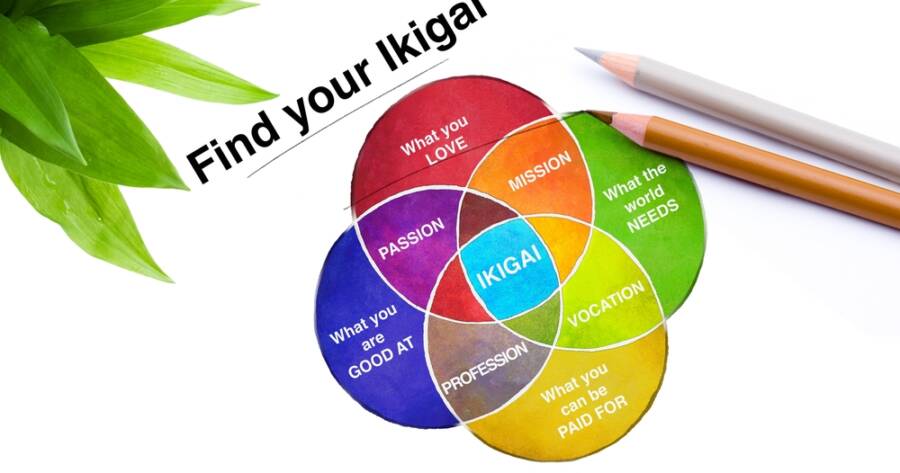Many people search for a deeper reason to wake up each morning beyond work or routine. The Japanese concept of ikigai offers a refreshing way to approach this search. Rooted in everyday life and self-awareness, ikigai is about discovering what truly brings joy and meaning—no matter your age or background. Learn how to integrate ikigai into your life.
What Is Ikigai?
Ikigai (pronounced “ee-kee-guy”) is a Japanese word that loosely translates to “a reason for being.” It combines two words: iki, meaning “life,” and gai, meaning “worth.” Rather than being a fixed destination or goal, it’s more like a compass that helps you navigate toward a fulfilling life.
In Japan, ikigai is often viewed as something simple, personal, and joyful. It could be as large as a lifelong career or as small as your morning cup of tea. What matters is that it gives you a reason to keep going. This approach has helped many people in Japan, particularly in Okinawa—known for its high number of healthy, happy elders—stay active and emotionally balanced well into old age.
The Four Elements of Ikigai
Western interpretations often break ikigai into four overlapping parts: what you love, what you’re good at, what the world needs, and what you can be paid for. When these four elements meet, that’s often where ikigai is found.
For example, a person who loves cooking, has strong culinary skills, sees food as a way to bring people together, and makes a living as a chef might feel that their work is their ikigai. However, ikigai doesn’t always have to involve your job. You might find it in volunteering, raising a family, painting, or gardening.
If you enjoy mentoring young people, and it energizes you, that could be your ikigai. If you’re passionate about climate change and spend your weekends cleaning up parks or organizing community efforts, that might be it. It’s not always about money, but rather about meaning.
Why Ikigai Feels Different from Western Goals
Many Western ideas of success focus on achievement: higher income, bigger homes, more recognition. While these goals have their place, they often lead to burnout or disconnection if they don’t align with what you truly value.
Ikigai focuses more on fulfillment than achievement. It asks you to slow down and reflect on your daily life. What moments make you feel most alive? What would you do even if you weren’t paid? These small clues are often more powerful than any large career milestone or financial win.
This is one reason why some Japanese elders say their ikigai is something like tending a garden, chatting with neighbors, or walking their dog. It’s not about big dreams—it’s about steady joy.
How to Start Discovering Your Ikigai
Finding your ikigai takes time, and there’s no perfect formula. But you can start by asking yourself a few simple questions:
- What are the moments in your day when you feel most satisfied?
- What do others often come to you for help with?
- If money were not an issue, what would you spend your time doing?
Try writing your answers in a notebook or journaling about your day for a week. You may begin to notice patterns. Perhaps you always feel energized after helping a friend solve a problem. Or maybe you feel peaceful when working with your hands.
You don’t need to quit your job or change your life overnight. In fact, many people find their ikigai by making small changes. Setting aside 30 minutes each day for something meaningful can be a big first step.
Ikigai and Mental Health
There’s growing interest in how ikigai relates to mental health, especially in the United States, where many people report feeling disconnected or overwhelmed. Studies suggest that people who feel they have purpose have a much lower chance of experiencing a sharp cognitive decline.
Unlike some productivity trends that encourage constant striving, ikigai encourages balance. It invites you to listen to yourself rather than compare your path with others. That’s especially helpful in a culture where people often feel pressure to succeed quickly or to stay constantly busy.
In Japan, many people who follow ikigai also value routine and community. They eat with others, walk every day, and engage in hobbies regularly. These habits help reinforce a sense of well-being and purpose.
Finding Ikigai Without Moving to Japan
You don’t need to live in Japan to apply ikigai to your life. The ideas behind it can be practiced anywhere.
Start by identifying what brings you joy and what gives you energy. Look for ways to do more of that each week. Try connecting with others who share your values. Whether it’s through a book club, a hobby group, or time with family, shared purpose often makes your own sense of meaning stronger.
If you’re feeling stuck, don’t worry. Many people explore different paths before something clicks. What matters is that you stay curious about your life. Ikigai isn’t a race or a checklist—it’s a gentle way of paying attention to what matters most to you.
Discover Meaning in Your Everyday Life
Ikigai offers a peaceful and powerful reminder: purpose doesn’t have to be big or flashy. It can be found in the quiet details of everyday life. Whether you find it in your work, your hobbies, or your relationships, what’s important is that it feels real to you.
If you take time to reflect, stay open, and follow what brings you joy, you may find your ikigai is closer than you think.

